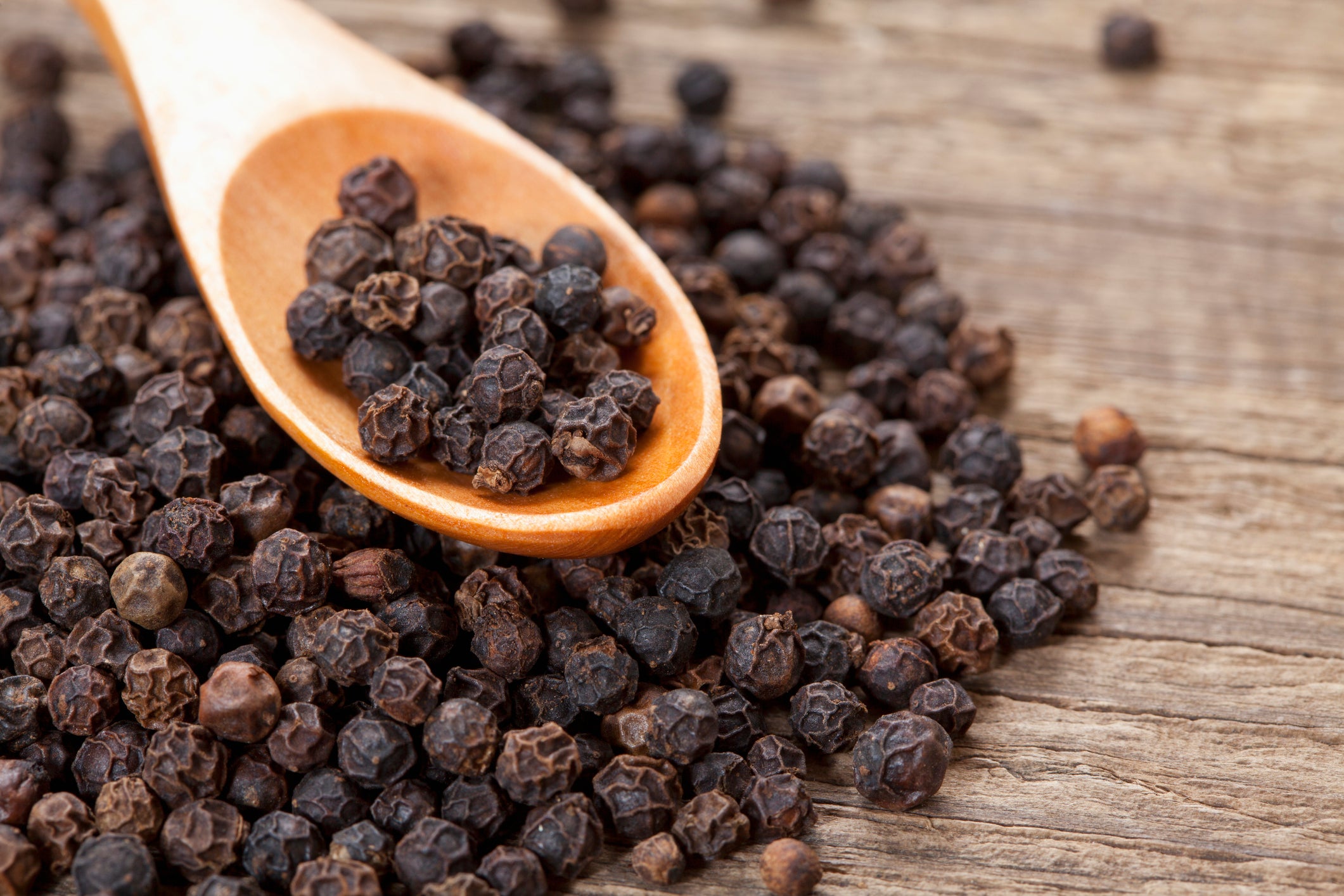Could black pepper be bad for you?
It’s the secret of many tasty dishes, but could the spice have a negative impact on our health? Laura Brown investigates

Everybody knows that consuming too much salt is bad for your health. But nobody ever mentions the potential impact of the other condiment in the cruet set: black pepper. Does it have an effect on your health?
Certainly, people through the ages have thought so. Black pepper, the dried berries of the Piper nigrum vine, has been part of traditional Indian (Ayurvedic) medicine for thousands of years. Ayurvedic practitioners believe that it has “carminative” properties – that is, it relieves flatulence. And in traditional Chinese medicine, black pepper is used to treat epilepsy.
Modern science suggests that black pepper does indeed confer health benefits, mainly as a result of an alkaloid called piperine – the chemical that gives pepper its pungent flavour, and a powerful antioxidant.
Antioxidants are molecules that mop up harmful substances called “free radicals”. An unhealthy diet, too much sun exposure, alcohol and smoking can increase the number of free radicals in your body. An excess of these unstable molecules can damage cells, making people age faster and causing a range of health problems, including cardiovascular disease, cancer, arthritis, asthma and diabetes.
Laboratory studies in animals and in cells have shown that piperine counteracts these free radicals. In one study, rats were divided into several groups, with some rats fed a normal diet and other rats fed a high-fat diet. One group of rats was fed a high-fat diet supplemented with black pepper and another group of rats was fed a high-fat diet supplemented with piperine.
The rats fed a high-fat diet supplemented with black pepper or piperine had significantly fewer markers of free radical damage compared with rats just fed a high-fat diet. Indeed, their markers of free radical damage were comparable to rats fed a normal diet.
Piperine also has anti-inflammatory properties. Chronic inflammation is linked to a range of diseases, such as rheumatoid arthritis. Here again, animal studies have shown that piperine reduces inflammation and pain in rats with arthritis.
Black pepper, the dried berries of the Piper nigrum vine, has been part of traditional Indian (Ayurvedic) medicine for thousands of years
Black pepper can also help the body better absorb certain beneficial compounds, such as resveratrol – an antioxidant found in red wine, berries and peanuts. Studies suggest that resveratrol may protect against heart disease, cancer, Alzheimer’s and diabetes.
The problem with resveratrol, though, is that it tends to break apart before the gut can absorb it into the bloodstream. Black pepper, however, has been found to increase the “bioavailability” of resveratrol. In other words, more of it is available for the body to use.
Black pepper may also improve the absorption of curcumin, which is the active ingredient in the popular anti-inflammatory spice turmeric. Scientists found that consuming 20mg of piperine with 2g of curcumin improved the availability of curcumin in humans by 2,000 per cent.
Other studies have shown that black pepper may improve the absorption of beta-carotene, a compound found in vegetables and fruits that your body converts into vitamin A. Beta-carotene functions as a powerful antioxidant that may fight against cellular damage. Research showed that consuming 15mg of beta-carotene with 5mg of piperine greatly increased blood levels of beta-carotene compared with taking beta-carotene alone.
Piperine and cancer
Black pepper may also have cancer-fighting properties. Test-tube studies found that piperine reduced the reproduction of breast, prostate and colon cancer cells and encouraged cancer cells to die.
Researchers compared 55 compounds from a variety of spices and found that piperine was the most effective at increasing the effectiveness of a typical treatment for triple-negative breast cancer – the most aggressive type of cancer.
Piperine also shows promising effects in minimising multidrug resistance in cancer cells, which potentially reduces the effectiveness of chemotherapy.
A word of caution, though. All of these things are fairly uncertain, as most of the studies have been in cell cultures or animals. And these sorts of experiments don’t always “translate” to humans. However, you can be fairly certain that adding a few extra grinds of pepper to your food is unlikely to cause you harm – and may well be beneficial.
Laura Brown is a senior lecturer in nutrition, food, and health sciences at Teesside University. This article first appeared on The Conversation
Join our commenting forum
Join thought-provoking conversations, follow other Independent readers and see their replies
Comments



Bookmark popover
Removed from bookmarks